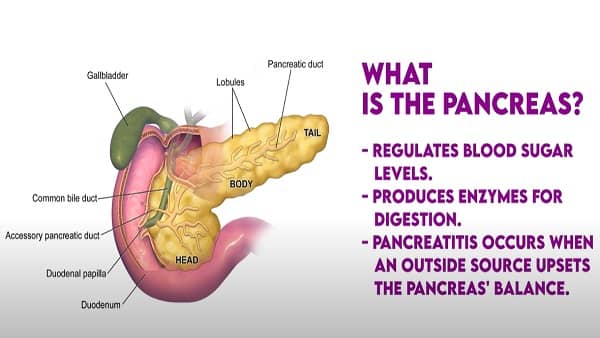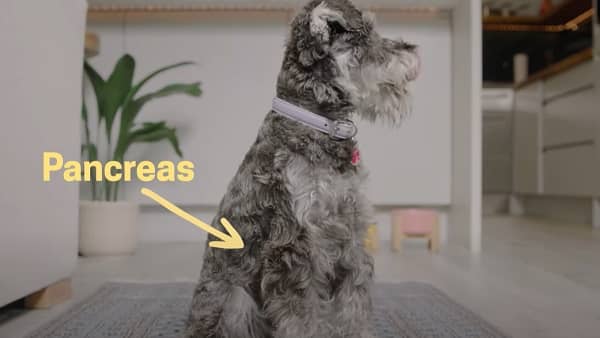Pancreatitis is a condition that should grab the attention of every dog owner. It poses a risk, to our furry companions if not handled correctly. In this article, we’ll look into the nature of pancreatitis its development in dogs, its causes, and treatments that can help our loving pets. Our pets deserve a caring environment and understanding of pancreatitis is essential for the health and happiness of our four-legged friends.

What is Pancreatitis?
Pancreatitis is when the pancreas gets infected. It further affects digestion and blood sugar levels. When the pancreas gets inflamed, its usual processes stop working, causing discomfort in the dog. Pancreatitis can range from moderate to severe and needs rapid veterinarian examination.
Causes of Pancreatitis in Dogs
We should pay attention to the factors that can lead to pancreatitis in our furry friends. Here are some of the causes:
1. Diet Dilemmas
What our pets eat is extremely important. Feeding them fatty or greasy foods might lead to disaster. Stick to their carefully prepared dog food and avoid sharing human meals, particularly fatty things.
2. Obesity when suffering from pancreatitis in dogs
Dogs must maintain a healthy weight. If our four-legged friends gain weight, they are more likely to get pancreatitis. So, keep them active and engaged with regular exercise and a well-balanced diet to keep those pounds away.
3. Trauma
If your dogs suffer a fall or an injury to their tummy, their pancreas may suffer. Trauma can be a cause of pancreatitis, so keep a check on them. It is important to be careful after any incidents.
4. Medications
Pancreatitis can also be caused by some drugs. This illness has been connected to several antibiotics and seizure medicines. If your dogs are on any long-term meds, it’s important to monitor their health and if you find any symptoms, seek veterinary help.

Symptoms of Pancreatitis in Dogs
Our dogs cannot communicate in words, it is up to us to pay great attention and recognize these symptoms. Let’s analyze the symptoms that may indicate pancreatitis in dogs.
1. Gastrointestinal Distress
If our dogs have pancreatitis, they may not feel well in the stomach. Keep observing symptoms such as vomiting, diarrhea, and a sudden loss of appetite.
2. Abdominal Pain
Imagine how unpleasant belly pain would be, and our pets feel the same way. They may show symptoms of abdominal pain, such as a bent back or sensitivity to touch around their tummy.
3. Fever and Dehydration
Your dog may develop a fever if he has pancreatitis. Keep a look out for symptoms of fever, such as a heated nose or ears. Also, pancreatitis might make them thirsty so they may drink more water than usual to stay hydrated.

4. Weakness
You should be concerned if our active dogs suddenly appear lethargic and weak. Pancreatitis can make them tired and unable to engage in their everyday activities.
5. Changes in Stool
Changes in their stool can also be a sign. Pancreatitis can cause greasy, pale, or bloody feces. Taking note of your pet’s bathroom routines while observing symptoms.
6. Unusual Post-Eating Behavior
Pancreatitis can make dogs restless or show signs of discomfort after eating. If they appear anxious after eating, it’s worth looking into more.
Treatment of Pancreatitis in Dogs
Dealing with pancreatitis in our beloved dogs can be difficult. You need not worry dog lovers, as we have some treatments to help them feel better. So, let’s explore how we can tackle pancreatitis with treatments.
1. Getting to the Vet when suffering from pancreatitis in dogs
If you feel that your dog may be experiencing pancreatitis, seek the assistance of a veterinarian. These trained experts possess the expertise necessary to diagnose the condition and guide you through the therapy journey.
2. Fluid Therapy
Fluid therapy is an important part of treatment. The vet may advise us to follow this to keep our puppies hydrated and electrolyte-balanced. It’s a way of helping them to recover in the functioning of vital organs and improve overall well-being.
3. Diet when suffering from pancreatitis in dogs
When your pet is healing, the vet will suggest a particular diet to follow. It’s important to give him easily digestible and low-fat meals to minimize the burden on their pancreas. Remember not to offer them any food scraps during this period as it can cause issues for them.

4. Medications
The vet may recommend medication to help our dogs be more comfortable. Pain medications can help reduce their suffering, but antibiotics may be required if additional infections develop. Giving them the proper medication at the right time can make their recovery easier.
5. Rest and Love
It’s important to remember that rest and affection are as essential as medical treatments. Your pups need you in this difficult time.
Conclusion
Pancreatitis is a dangerous risk to the health of dogs and requires medical attention. It is crucial for dog owners to have a comprehensive understanding of the causes, symptoms, and available treatments in order to safeguard their pet’s health. If you suspect that your dog may be suffering from pancreatitis, seek veterinary care instantly for recovery.

